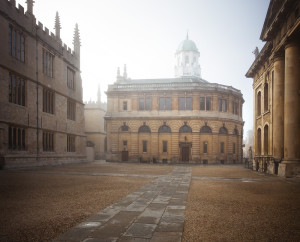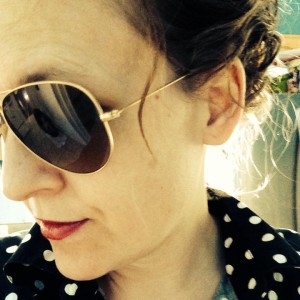It’s always in the in-between spaces where freedom seems to creep in unnoticed, filling up cracks and crevices of latent longing.
My final year of college, I left my fiancée, boarded a plane with my black umbrella, and touched down where the Inklings once walked. I was spending a semester in Oxford, and I planned to drink it all in–the architecture, the academic rigorousness, the living on my own. The main dorm was full, so I was placed with six other young women in a tiny, run-down flat a few miles from The Centre for Medieval and Renaissance Studies.
We rode our bikes back and forth between classes cutting through Christ Church Meadows. There we met Zoe, an old woman draped in the velvet colors of wood nymphs. She could always be found on her bench, communing with a reality we couldn’t see, her eyes full of poetry and fire. She sat with the tree branches bending back towards the water, their designs on the cards she sold. I slowed down to hear her voice.
In all of the in-between spaces, there was time to meander home each day, to make dinner in our closet of a kitchen, to see deer grazing at Magdalen College.
We’d tape up medieval history timelines on our living room wall between the stenciled fleur-de-lis; we covered it in  colored post-it notes and memorized until we were bleary-eyed. We’d have brilliant thesis statements for papers on Spencer’s Faerie Queen or Jane Austen and forget them in the morning. We quickly learned the routes to and from the city center, hopping on bikes to seminars and spreading out around the city, often leaving bikes in a tangle at the Bodleian Library.
colored post-it notes and memorized until we were bleary-eyed. We’d have brilliant thesis statements for papers on Spencer’s Faerie Queen or Jane Austen and forget them in the morning. We quickly learned the routes to and from the city center, hopping on bikes to seminars and spreading out around the city, often leaving bikes in a tangle at the Bodleian Library.
We were thirsty for knowledge and we drank our fill.
Some of us came from more fundamentalist Christian colleges, where women were still required to wear skirts to chapel. Others, like me, came from classically evangelical colleges, where following rules made you holy. If we kept our doors open when our boyfriends visited, if we didn’t skip out on chapel, if we got A’s, then we’d have the boxes checked on the list of Good Christian Woman. We were all caught right in the middle of all of the “if…then’s…” and we hadn’t even known it.
Sometimes it takes moving places to see where you’ve come from. It was in that land of willow trees and spires, where C. S. Lewis and J. R. R. Tolkein seemed to haunt our Christian memory, that we gingerly stepped into freedom.
We moved out of rules, out of guidelines, and out of cultures that told us how to be a Christian woman. We said goodbye to boyfriends, we jumped on planes to France, and we toured Scotland and the Isle of Wight. We figured out train timetables for ourselves. We drank wine and cooked together.
Slowly, over the course of weeks, our walking, biking, and traveling created intimacy. Then, it was the scholarly living-in-community I valued, where I was finally surrounded by a cohort of similarly serious women. Now, I realize it was my first foray into womanhood and freedom.
You didn’t have to wear a skirt to follow Jesus.
You could discuss postmodernist literary theory and the practices of St. Benedict in one breath and not be looked at askance. You could be smart and thoughtful and strong and beautiful. You could be everything.
We didn’t want to choose between love and family, and living a thoughtful life. We imagined more for our futures than the version of stay-at-home motherhood our Christian subcultures told us was the epitome of womanhood.
We craved a grounded womanhood, a womanhood rooted in the poetry of the land, with ideas that mattered and voices that were heard – no matter what we did for work or family life. We wanted a womanhood where we could stand sure-footed, warrior-strong, and wear our gentleness like a glorious garment.
We flung our hands from covering our own mouths.
We were women whose voices were no longer silenced, but freed. At the end of the semester, we met around a table in a pub that used to be a church and affirmed one another, our womanhood, and our personhood. We knew it to be a bit silly even then, but with our umbrella drinks in hand, we reclaimed the evangelical rites of testimony. Our words were thick with feeling as we testified to the goodness of each woman, to the Spirit within. We pushed back our individual darknesses, the lines in sand that said this was how you were to be a woman. We saw one another while the fading icons watched from the walls.
There was more holiness around that table than in the rules we had left.
When I took a plane across the land and across the ocean, I thought it’d be the seminar rooms and the spires of Oxford that would stay with me. It was to be a sort of squeaky clean, pristine memory of old musty libraries, endless cups of tea, the solitary scholar behind a desk, and reams of notes signifying academic progress.
But freedom was somewhere in the spaces between. It was in the orange walls of a run-down flat, and the hallowed halls of pubs; it was the paths between our home and seminars, and it was in a group of women finally released to affirm their personhood instead of static gender roles. It was in all the little particulars – it was in all the places of imperfection where I found freedom, and wholeness, and how I, too, had a voice.
* * * * *
 Ashley Hales describes herself as a recovering good girl who’s been caught by the wide mercy of Jesus. She clings to stories, hot cups of coffee, and “me, too” conversations with girlfriends. She’s mama to 4 littles, wife to her church planter husband, and holds a Ph.D. in English. She writes at Circling the Story and The Mudroom and loves to make friends on Twitter.
Ashley Hales describes herself as a recovering good girl who’s been caught by the wide mercy of Jesus. She clings to stories, hot cups of coffee, and “me, too” conversations with girlfriends. She’s mama to 4 littles, wife to her church planter husband, and holds a Ph.D. in English. She writes at Circling the Story and The Mudroom and loves to make friends on Twitter.
“Oxford in the Mist Photo” by lorenzaccio